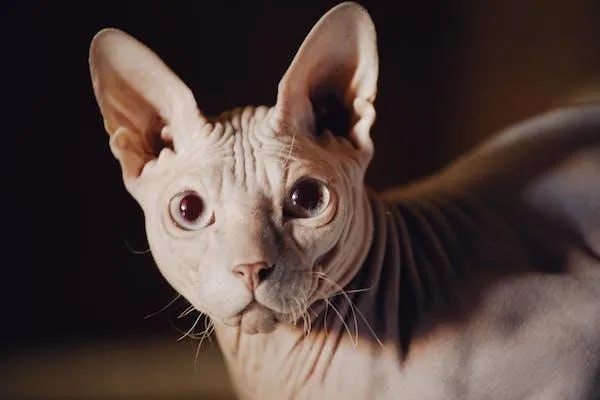

Sphynx
Sphynx cats, with their unique hairless appearance, capture the attention and curiosity of many cat enthusiasts around the world.
They may not have a luxurious furry coat, but they certainly have a lot to offer as pets.
These fascinating felines possess distinct characteristics that make them suitable companions for the right home.
The Origin of Sphynx Cats: Contrary to popular belief, Sphynx cats are not entirely hairless. They have a fine layer of downy fuzz that gives them their distinctive appearance. The breed originated in the 1960s when a naturally hairless kitten named Prune was born in Toronto, Canada. Breeders then carefully selected and bred hairless cats to develop the Sphynx breed we know and love today.
Affectionate: Sphynx cats are incredibly affectionate and enjoy being close to their human companions. They crave attention and love to cuddle, making them great lap cats.
Social and Playful: These cats are highly social and usually get along well with other pets. They have an energetic and playful nature, often entertaining their owners with their antics.
Low Grooming Requirements: With no fur to shed, grooming a Sphynx cat is a breeze. However, they do require regular ear cleaning and occasional bathing to remove oil buildup on their skin.
Hypoallergenic Qualities: While no cat is entirely hypoallergenic, Sphynx cats are often preferred by some individuals with allergies since they produce much less dander than their furry counterparts.
Sphynx Cat Colours: Sphynx cats come in a wide variety of colours and patterns, just like other cat breeds. Some of the common colours include:
White: Pure white with pink or brown eyes.
Black: Solid black with green or gold eyes.
Blue: Dilute greyish-blue with vivid blue eyes.
Red (Ginger): Intense reddish-orange with green or gold eyes.
Cream: Light cream color with blue or gold eyes.
Tortoiseshell: Mix of black and red patches with green or gold eyes.
Calico: White with patches of black and red with green or gold eyes.
Tabby: Different tabby patterns (striped, spotted, mackerel) with varying eye colours.
Temperament: The Sphynx cat's personality is often compared to that of a dog. They are loyal, friendly, and enjoy being the centre of attention. They form strong bonds with their owners and will follow them around the house, always seeking interaction and affection. Due to their social nature, leaving a Sphynx cat alone for extended periods may lead to boredom and potential behavioural issues.
Unique Behaviours:
Heat-Seekers: Since they lack fur, Sphynx cats seek out warm spots and may cuddle up to their owners for extra heat.
High-Energy Jumpers: These cats are known for their impressive jumping abilities and can often be found perched on high surfaces.
Vocal Communication: Sphynx cats are quite talkative and will use various vocalisations to express themselves and seek attention.
Caring for Sphynx Cats: Caring for a Sphynx cat involves some specific considerations due to their lack of fur. Their skin needs protection from the sun and can become oily, so regular bathing (about once a month) is necessary. Additionally, they require occasional ear cleaning to prevent wax buildup. Their body temperature tends to be higher than other cats, so ensure they have a warm environment and provide them with cosy spots and blankets.
Health Considerations: Sphynx cats are generally healthy, but like all breeds, they may be predisposed to certain conditions. Common health issues to watch out for include hypertrophic cardiomyopathy (a heart condition) and respiratory issues due to their lack of fur.
In summary, Sphynx cats may look exotic and different, but their loving and affectionate nature makes them wonderful pets for the right individuals or families. Their unique appearance, social behaviour, and low grooming requirements make them a popular choice among cat enthusiasts. If you're ready to provide the extra care and attention these delightful felines need, you might just find a loyal and devoted companion in a Sphynx cat.